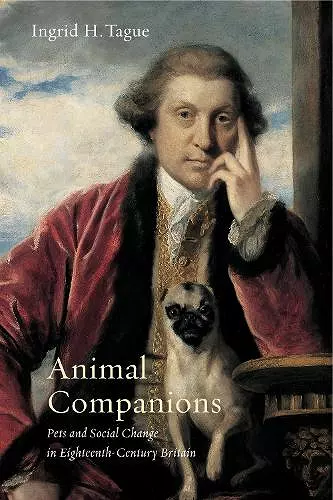Animal Companions
Pets and Social Change in Eighteenth-Century Britain
Format:Hardback
Publisher:Pennsylvania State University Press
Published:20th Apr '15
Currently unavailable, and unfortunately no date known when it will be back
This hardback is available in another edition too:
- Paperback£26.95(9780271065892)

Animal Companions explores how eighteenth-century British society perceived pets and the ways in which conversation about them reflected and shaped broader cultural debates.
While Europeans kept pets long before the eighteenth century, many believed that doing so was at best frivolous and at worst downright dangerous. Ingrid Tague argues that for Britons of the eighteenth century, pets offered a unique way to articulate what it meant to be human and what society ought to look like. With the dawn of the Enlightenment and the end of the Malthusian cycle of dearth and famine that marked previous eras, England became the wealthiest nation in Europe, with a new understanding of religion, science, and non-European cultures and unprecedented access to consumer goods of all kinds. These transformations generated excitement and anxiety that were reflected in debates over the rights and wrongs of human-animal relationships.
Drawing on a broad array of sources, including natural histories, periodicals, visual and material culture, and the testimony of pet owners themselves, Animal Companions shows how pets became both increasingly visible indicators of spreading prosperity and catalysts for debates about the morality of the radically different society emerging in eighteenth-century Britain.
“Thanks to animal studies, the difference between ‘animal’ and ‘human’ is neither stable nor certain. Tague approaches this hierarchy from the human end of the spectrum, finding touching and significant ways in which human pet owners reified or challenged the animal-human relationship in the eighteenth century as pet keeping evolved from a proscribed to an approved cultural practice.”
—Ann-Janine Morey American Historical Review
“Ingrid Tague’s Animal Companions helps us understand the extraordinary innovation entailed in the rise of pet keeping in eighteenth-century England. Tague shows how, rather suddenly, the widespread acceptance of relationships of intimacy between human and nonhuman animals shaped political, social, and intellectual views and debates. The rise of pet keeping brought abstract Enlightenment questions into the realm of concrete debate—around the nature of the human, the concepts of ownership and slavery, relationships of affection and alterity, and the exercise of humanitarianism and the ideal of harmony. Tague’s book gives us new insights into the role of human-animal relationships in defining key questions about the human.”
—Laura Brown, Cornell University
“It would surprise many in our pet-centered world to know that keeping pets was once considered a highly suspect practice, a wasteful, sinful overvaluing of animals that threatened individual and national character. Ingrid Tague’s history of pet keeping in eighteenth-century England illustrates how it evolved, by century’s end, into a broadly accepted, even ‘natural’ part of everyday human life. Populated by memorable characters, both human and animal, and characterized by admirable scholarship and insightful analysis, this wide-ranging and densely detailed historical study investigates how pets functioned as important vehicles in some of the most vexed debates of the day concerning consumption, fashion, morality, sensibility, slavery, gender, and social class.”
—Karen Raber, University of Mississippi
“Ingrid Tague’s study contributes to the animalizing of social history since the Enlightenment. During the eighteenth century, global commerce, slavery, and empire made pet keeping newly possible for many people on both sides of the Atlantic. At the same time, Enlightenment ideas and the rise of commercial and consumer society fuelled new desires for the companionship of domestic animals. Pets ceased to be marginal and became central. Analyzing the entanglements of pets with class, gender, and slavery, but also fashion, frivolity, and property, Tague illuminates how eighteenth-century Britons and their colonial counterparts had recourse to animals for thinking through the most searching questions of their time.”
—Donna Landry, University of Kent
“Ingrid Tague’s well-documented and clearly written Animal Companions: Pets and Social Change in Eighteenth-Century Britain, the first systematic treatment of pet keeping in Enlightenment Britain, traces the evolution of affection toward domestic animals from the beginning of the century, when pet keeping was stigmatized as a waste of human resources and feelings, to the end of the period, when compassion for animals was seen as a necessary sign of genuine humanness. The discussion of the relation between pet keeping and racial theory during the Enlightenment is of particular interest.”
—Matthew Senior, Oberlin College
ISBN: 9780271065885
Dimensions: 229mm x 152mm x 25mm
Weight: 612g
320 pages